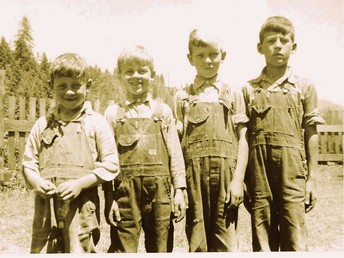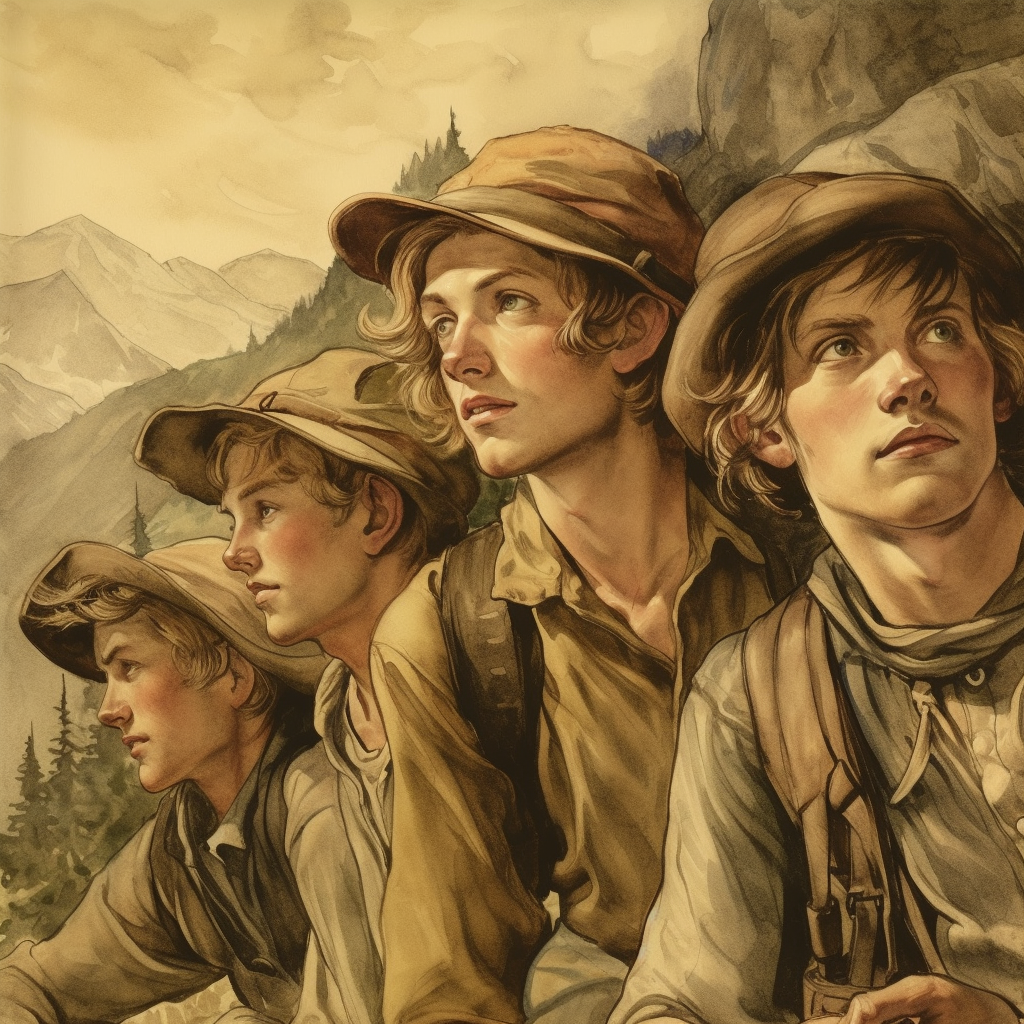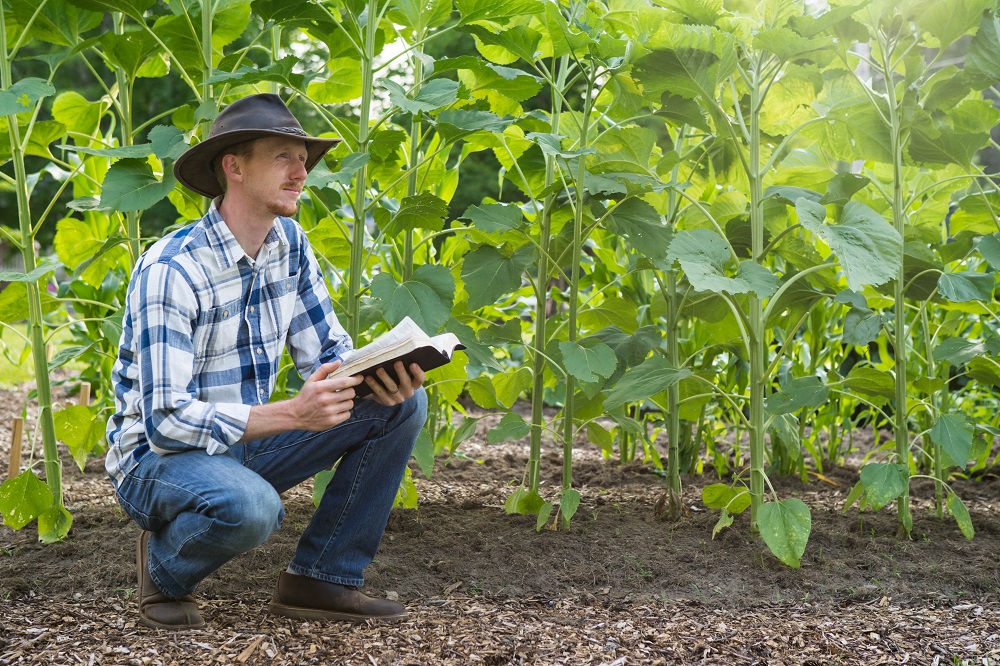
It is interesting to note that an agri-lifestyle is very consistent with and supportive of the Biblical model of the family. The abandonment of the agricultural family economy during the industrial revolution is partly responsible for much of the breakdown of the Christian family and morals.
Humanist historians Will and Ariel Durant, well known for their work, The Story of Civilization, wrote a book to sum up what they had learned from their study called The Lessons of History. It is a shocking book revealing the fruits of a worldview without Christ. Nevertheless they made a very good, though twisted observation of the impact our shift from an agricultural nation to an industrialized nation had on the morals of the family.
In their chapter, “Morals and History”, they falsely contend that morals are the natural result of economic and social models. They say that first there was the hunter/gatherer moral code of survival of the fittest, then the agricultural moral code, then the industrial moral code. What is interesting to me is that they attribute the Christian standard of ethics to the agricultural code because of the way an agrarian lifestyle fits with the biblical model of family. Here is a quote:
“Children were economic assets; birth control was made immoral. On the farm the family was the unit of production under the discipline of the father and the seasons, and paternal authority had a firm economic base. Each normal son matured soon in mind and self-support; at fifteen he understood the physical tasks of life as well as he would understand them at forty; all that he needed was land, a plow, and a willing arm. So he married early, almost as soon as nature wished; he did not fret long under the restraints placed upon premarital relations by the new order of permanent settlements and homes. As for young women, chastity was indispensable, for its loss might bring unprotected motherhood. Monogamy was demanded by the approximate numerical equality of the sexes. For fifteen hundred years this agricultural moral code of continence, early marriage, divorceless monogamy, and multiple maternity maintained itself in Christian Europe and its white colonies. It was a stern code, which produced some of the strongest characters in history. “
I believe that the Durants had it backwards. Instead of the view that a family-based, agrarian lifestyle results in Christian morals, it could be viewed that Christian morals result in the former. It is also interesting to note their description of the destruction of the family and Christian morals through the rise of industrialism.
“Gradually, then rapidly and ever more widely, the Industrial Revolution changed the economic form and moral superstructure of European and American life. Men, women, and children left the home and family, authority and unity, to work as individuals, individually paid, in factories built to house not men, but machines. Every decade the machines multiplied and became more complex; economic maturity (the capacity to support a family) came later; children no longer were economic assets; marriage was delayed; premarital continence became more difficult to maintain. The city offered every discouragement to marriage, but it provided every stimulus and facility for sex. Women were “emancipated” – i.e., industrialized . . . The authority of father and mother lost its economic base through the growing individualism of industry. The rebellious youth was no longer constrained by the surveillance of the village; he could hide his sins in the protective anonymity of the city crowd. The progress of science raised the authority of the test tube over that of the crosier; the mechanization of economic production suggested mechanistic materialistic philosophies: education spread religious doubts; morality lost more and more of its supernatural supports. The old agricultural moral code began to die. “
So what can we learn from this? Well, I don’t believe that farming is the only profession, or a more ‘sacred’ profession, for Christians, but I do believe that it is one of the most foundational. Farming is a fundamental application of a family economy; an economy based upon productive families working together. This is what we see in the garden of Eden. A family placed in a garden, working together and producing fruit for the glory of God.
We need to realize the impact the man-centered industrial revolution has had on the family. We should consider a return to God-centered, family-based economic models. We should look for models where families can work together for the kingdom of God, building relationships, encouraging one another, and providing accountability and a glorious testimony to the world around them. There are many areas of work that can be viable in building God-glorifying family economies; manufacturing, services, trade, information, etc. But I do believe that the reformation of our economy to rebuild Christian families needs to start with recapturing the work of the soil.



I couldn’t agree more. I grew up on a farm back in the 60s and have always dreamed of living a rural life once again. I can’t imagine a better life for a child. My mother was a homemaker at that time and I always knew that, even though he was working, he was around. We would help out around the farm- I can remember helping mom turn live chickens into dinner- and it made us feel we were part of something that we all shared. Later, my father got a factory job and we moved into town. Dad was no longer around, especially those times when he worked two jobs. Mom also began to work outside the home, and my brother and I would be left on our own at times. (And as youngsters will, we often got into mischief.) Farm life was not easy at tiimes, but I wouldn’t trade my childhood memories for anything. I believe the fractured families of our modern society can be traced directly to the loss of the agrarian lifestyle.
Mr. Berry,
A sobering testimony. But it is encouraging to me to see all the Christians around the country that the Lord is bringing back to the land. It is a form of ‘revival’, because only God can take the credit for it. I pray that it will result in the strengthening of families and the advancement of the Kingdom of God.
Noah
I agree with your conclusion. It is good to see.
We enjoyed seeing your family last weekend .
Good stuff Noah;
Sadly many, even those espousing the sufficiency of scripture, have often sought to “Christianize” the culture by shoe horning it into what scripture says. This, instead of weighing everything against God’s word and asking what it has to say about any and every situation and making decisions based on His word not some immediate gratification.
If Christians had asked what God’s word said about such advances, if they in hindsight can be called that, as the Industrial Revolution and applied His word to the day we may have seen a different culture arise. No one seems to have looked past the apparent immediate benefit to ask what the long term issues would be of such a revolution and how it would affect the biblical model that God calls His people to follow. If we do not as a people of God change how we evaluate what we do we will only see the same thing over and over.
However, there are those that do seek to live lives directed by God’s word, empowered by His Spirit, and therein is the hope. Some see a move back to the land as moving backward but instead it should be seen as move to forward His kingdom by a reliance on God and His word.
Again, thanks for the article.
I have just found your blog and have just started to read it. I am a farm wife for 13 years now and there are a few questions i would like to ask you.
Are you using heritage seed?
Are you farming organically?
If you are farming organically how ar you managing to keep the pesticides and fertlizers off your land from neighbouring farms?
The one comment i have is I was unclear about your views on Children in regards to farming and how the families use to be bigger. Are you supporting the necessity of a large family, ie: Quiverful? Or are you limiting the “blessings” from God.
Also, in the turn of the last century, large families were necessary because farming was a very dangerous occupation. A family had many children becuase when a child or the father was dragged to death, stomped, fell in the threasher etc etc, you had to have someone take their place or the whole farm failed. We are not quite that vunerable in this day and age.
Sky,
I appreciate your questions.
As far as your questions regarding my farming practices, we do use ‘heritage’ or open-pollinated seeds as much as possible. I don’t think it is wrong to use hybrids in all circumstances, but I don’t think it would be prudent to become dependent upon them. And to say they are always better would be to disregard the wisdom in the stability of ‘naturalized’ varieties like we see in Creation. I don’t grow any GMO crops in order to try and honor the distinction of ‘kinds’ that God made, but I still feed some of my chickens feed with GMO grain in it because I haven’t found a reasonable alternative yet, but am trying to work on it. We are not certified organic, but you could say that the way we farm could be considered such for the most part. This is primarily because organic practices are more in line with God’s design because it acknowledges the wisdom of God in Creation, even though it doesn’t acknowledge the Creator. We try to focus on building relationships with our customers so that we are ‘customer-inspected’ rather than government inspected. I want someone to buy from us because they trust us and know us, not just because we have a stamp of approval from the government. I want to be able to point to Christ as the reason for the way we farm. As far as keeping from being contaminated by neighboring farms, we farm in hill country where there aren’t really any ‘farms’ around us except pine tree plantations and small pastured cattle operations. I can imagine that it would be difficult to be right next to a farm that impacted yours through their practices, but I believe God can give us grace and wisdom to be faithful where He has placed us.
As far as your questions about family, we believe that children are a blessing from the Lord and desire as many, or as few, as He chooses to bless us with. The cool thing about farming is that it provides opportunity for practically everyone in a family to be productive, instead of just being consumers. One of the reasons children are viewed as undesirable today is because they are expected to be consumers (a liability to the family) instead of producers (an asset to the family). I am not talking about just ‘using’ children as labor, but preparing them for life through teaching them to work, be fruitful, and serve others. In regards to the necessity of large families due to the danger of a farming life, I don’t believe that the reason most people used to have large families was to have enough replacement workers to keep the farm going in the case of an accident. There are dangers associated with some aspects of small scale farming, but I think it’s at least as dangerous today to commute an hour to work at a ‘safe’ desk job. Plus, the purpose of the farm is to provide for and support the family, not the other way around. Our farms should be designed to be beautiful, fruitful homes that are family friendly, not just factories where we happen to also live.
Those are a few of my thoughts. I hope they may be somewhat helpful. Seeking to honor the Lord in any are of our life is a journey of sanctification, and we never arrive perfectly. My farm is far from perfect. But the goal is to be headed toward Christ and encourage one another along the way in the Lord, even if He may have us on different stages of the journey.
In Christ,
Noah
Noah, we are excited to learn of your new book!
We look forward to reading it!
God bless you and your sweet family!
Lee, Beth, Taylor, and D. L.
It’s good to hear from you! I look forward to hearing how you like the book.
Much in our world has changed since agriculture became the minority. I noticed a huge difference in the farm community verses the mainstream society at last year’s Empire Farm Days here in NY. I don’t usually promote my own blog on someone else’s, but maybe you’d be interested in this post. http://7rewards.blogspot.com/2011/08/do-farmers-help-improve-morality-of.html
I do believe the moral decay of our world is due to Christians not taking a stand as we should, but I also found the contrast between farmers and the rest of society something to think about.
Interesting thoughts! I always see the Bible as showing an agrarian lifestyle, although I think it is harder to get back to that in the world of today. It is something that I am working towards now though. I wonder if this lifestyle was promoted within the church if more people would come to it earlier, rather than make the choice later in life at which point other factors could hinder the ideal outcome – ie a whole lot of debt 🙂 Look forward to reading more about your journey!
Good evening,
I just happened upon your blog post (was searching for agrarian lifestyle pictures) and just have to say how glad your post makes me. It seems like your stand has become so rare and yet if we wish to survive, it is so vital… Thanks for sharing this. May your family be richly blessed, as it will according to His promise.
“Therefore you shall keep his statutes and his commandments, which I command you today, that it may go well with you and with your children after you, and that you may prolong your days in the land that the Lord your God is giving you for all time.” ” (Deu 4:40)
Anne Denney